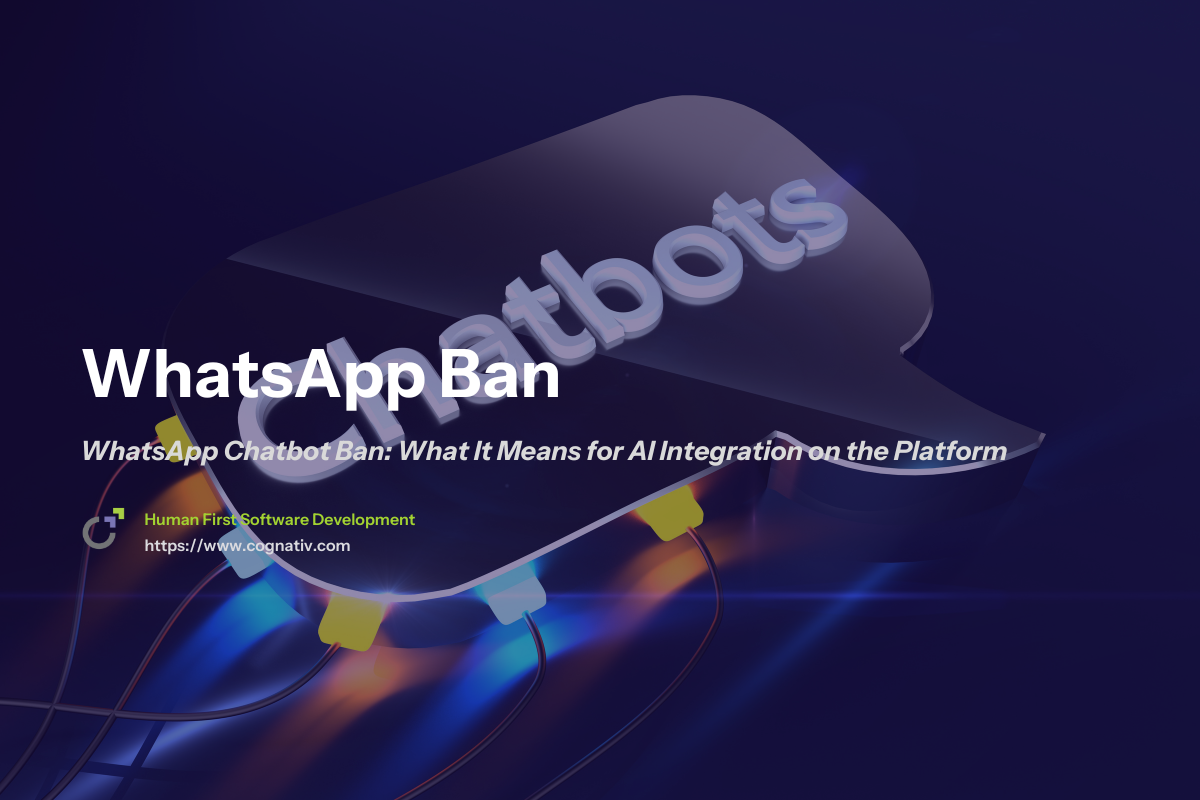WhatsApp Chatbot Ban: What It Means for AI Integration on the Platform
WhatsApp has updated its business API terms to ban general purpose AI chatbots starting January 15, 2026, reshaping the landscape for third-party AI chatbot providers and impacting their growth opportunities.
The policy explicitly prohibits AI model providers—including those using large language models, generative artificial intelligence platforms, or machine learning technologies—from distributing their AI chatbots on the platform. This ban applies to the use of the WhatsApp Business Solution whether directly or indirectly, restricting offering, selling, or otherwise making available such technologies as the primary rather than incidental function. Companies like OpenAI, Perplexity AI, Luzia, and Poke, which have built significant user bases through WhatsApp, will be directly affected.


Introduction to the Ban
Meta, the owner of WhatsApp, announced this ban on general-purpose AI chatbots to refocus the WhatsApp Business API on its core purpose: enabling businesses to provide customer support and send relevant updates. According to a Meta spokesperson, the Business API is designed to support tens of thousands of businesses building customer support experiences, not to serve as a platform for chatbot distribution.
The decision is driven by infrastructure concerns, as general purpose AI chatbots generate high volumes of messages, media, and voice interactions that strain WhatsApp’s systems. The updated policy strictly prohibits AI providers from using the WhatsApp Business API for primary AI chatbot functionalities. Meta AI will remain the only general-purpose AI chatbot allowed on WhatsApp, consolidating Meta's control over AI integration on the platform.
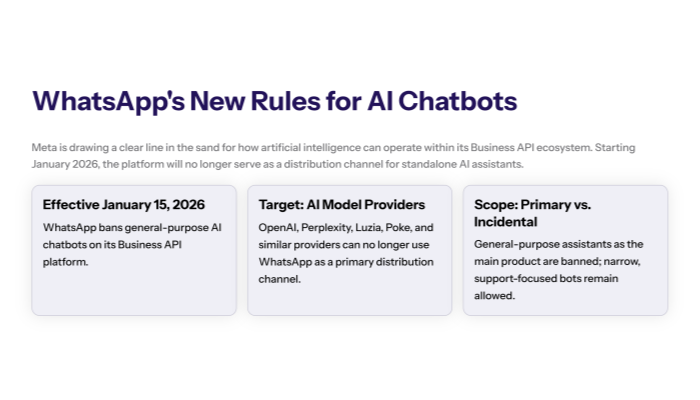

Meta’s Rationale for Banning General Purpose AI Chatbots
Meta stated that the surge in general purpose chatbots led to increased message volume and system load on the WhatsApp Business Solution, requiring infrastructure and support beyond the API’s intended scope. The Business API was originally built to help businesses provide customer support and send relevant updates—not to act as a distribution channel for general-purpose AI assistants.
While businesses can continue to use machine learning technologies and AI features for customer engagement, deploying general purpose chatbots as the primary function is prohibited. This policy keeps the platform aligned with its mission to support businesses serving customers.


The Impact on Third-Party AI Chatbots
Third-party AI chatbots operating on WhatsApp, such as ChatGPT and Perplexity, have offered interactive AI experiences including voice input, media understanding, Q&A, and image generation. These capabilities effectively turned WhatsApp into a large AI distribution platform.
Starting January 15, 2026, these functionalities will be blocked for external AI model providers, leaving Meta AI as the sole assistant on the platform. This limits the options for AI companies to reach WhatsApp’s vast user base and forces them to explore alternative distribution channels.
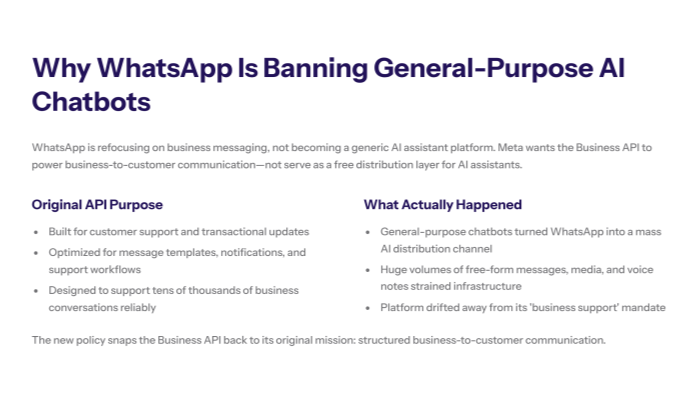

Businesses Using AI Remain Unaffected
Meta clarified that businesses using AI chatbots incidentally—for example, a travel agency running a bot to answer customer questions or send updates—are not impacted by this policy change. The WhatsApp Business Solution remains focused on structured communication templates for customer support and relevant updates.
The ban specifically targets cases where general purpose AI chatbots are the primary product rather than a supporting feature, ensuring the platform supports businesses serving customers rather than open-ended chatbot interactions.
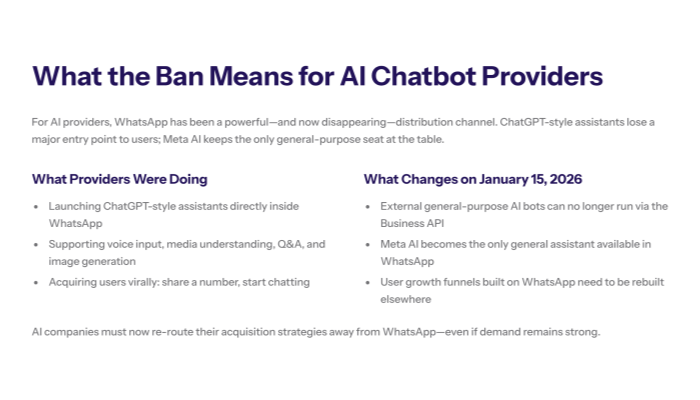

Economic and Strategic Motivations
Beyond infrastructure concerns, the Business API is a key revenue channel for Meta, charging businesses based on message templates such as marketing, utility, authentication, and support. General purpose chatbots did not fit into this monetization model, generating significant traffic without contributing to revenue.
During Meta’s Q1 2025 earnings call, Mark Zuckerberg emphasized the strategic importance of business messaging as the next pillar of Meta’s business. Enforcing the Business API terms ensures monetizable use cases are prioritized, while eliminating usage outside the platform’s intended design.
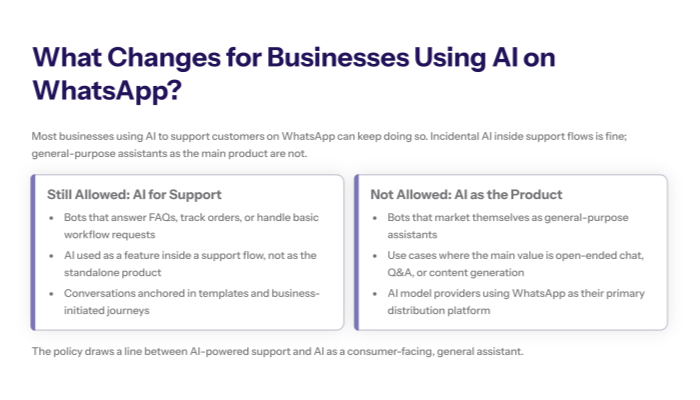

Meta AI Becomes the Only Assistant
With this policy update, Meta AI will be the only general-purpose assistant available within WhatsApp. This move consolidates Meta’s control over AI integration in its messaging ecosystem and limits external AI model providers’ access.
Competitors like OpenAI and Perplexity must now develop alternative distribution channels or rely on integrations outside Meta’s environment, fundamentally changing the competitive landscape.
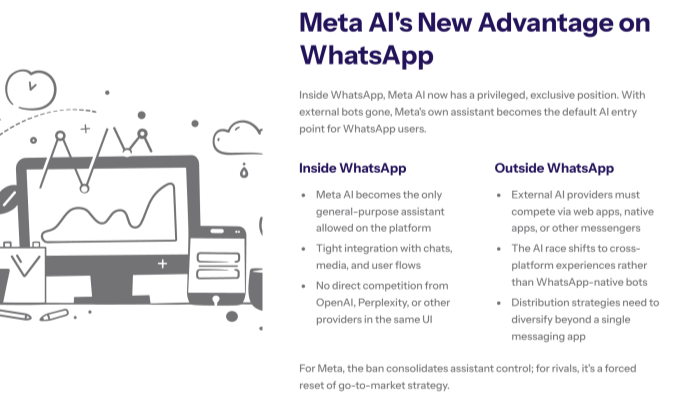

How This Affects the AI Race?
The WhatsApp chatbot ban arrives at a critical moment in the AI race. Messaging platforms are powerful vectors for reaching billions of users, and general purpose AI chatbots have become central to many users’ workflows.
This ban forces AI companies to reset their strategies, focusing on standalone apps, web interfaces, or other platforms like Telegram or Messenger to maintain reach.
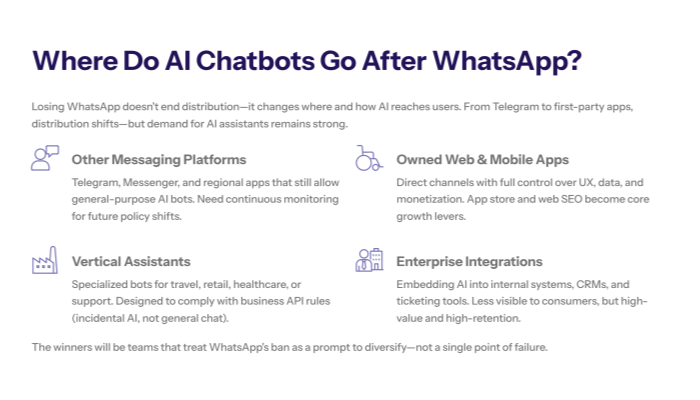

Alternative Solutions for AI Providers
AI model providers may explore:
-
Other messaging platforms that currently allow general purpose chatbots, such as Messenger or Telegram.
-
Web-based or mobile-first apps outside WhatsApp’s ecosystem.
-
Proprietary integrations compliant with business API terms, focusing on incidental rather than primary chatbot functionality.
-
Specialized AI assistants tailored to vertical use cases like travel, retail, or customer service.
This shift may spur innovation as companies adapt to tighter platform restrictions.

Broader Industry Implications
Meta’s ban may set a precedent for other major platforms. As general purpose AI chatbots scale, concerns about infrastructure costs, moderation, security, and monetization are driving tighter platform controls.
This decision aligns with industry trends toward controlled AI ecosystems, favoring native assistants like Meta AI over external competitors. It raises questions about competition, interoperability, and the balance of power between large platforms and independent AI model providers.
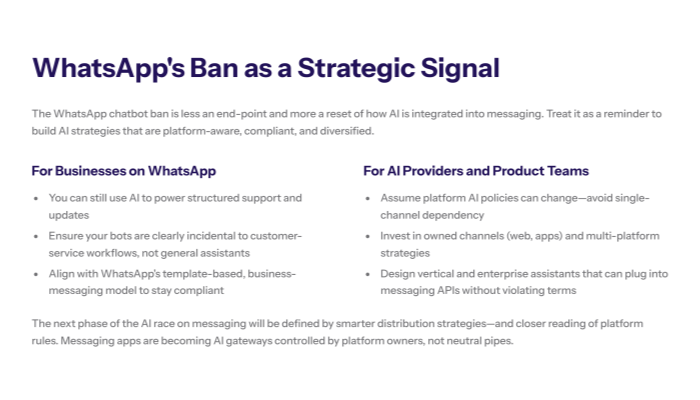

Future of AI on Messaging Platforms
Messaging apps are key battlegrounds in the AI race, serving as critical distribution channels for consumer-facing AI. Meta’s policy ensures the platform remains focused on business messaging, reducing support complexity and increasing monetization opportunities.
For businesses, this means fewer options for integrating third-party AI chatbots but more stability and control over customer support workflows. For AI providers, diversification across multiple channels will be necessary to maintain reach and AI strategies can play a critical role in achieving this.

Conclusion: A Turning Point for AI Chatbots
The WhatsApp chatbot ban is a strategic realignment positioning Meta AI as the only assistant on the platform, pushing external general purpose AI chatbots out of the ecosystem.
AI companies like OpenAI and Perplexity must rethink distribution strategies, while businesses gain clearer guidelines on responsible AI use under the Business API terms.
This decision signals a new phase in the AI race—defined by tighter control, platform monetization, and fewer open channels for AI model providers.

